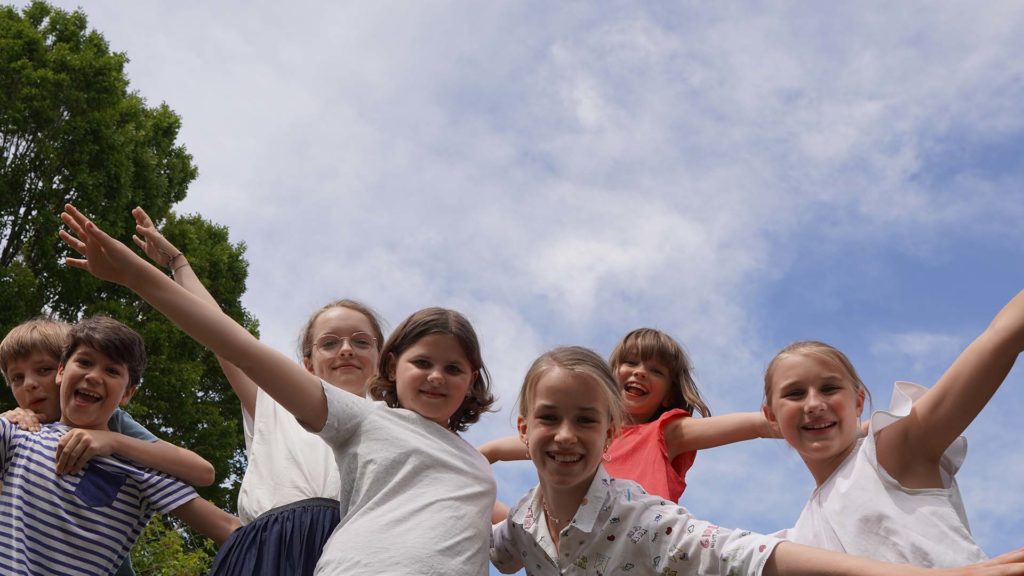4 to 1 Earths: An Adventure in Ecology
We filmed a documentary about the summer camp experience, highlighting the methods that anyone can apply to reduce consumption in their daily lives and helping raise awareness about environmental protection.
Here you can find a short description of each episode and the respective links (green headings) that lead you directly to YouTube. Every episode is full of interesting revelations, fun stories and intriguing activities – and with Episode 7, we even enrolled in Film Festivals!
Sylvia Rotter has always had personal connections to the preservation of nature and the environment. Her idea of a camp, in which young people are taught the ways of a sustainable lifestyle, is coming to fruition in this documentary. Two months before the camp begins, a group of young Romanians take their first test, determining their ecological footprints in the city. The surprise and shock grows on the first day of the camp, as the children are faced with the reality of the rural lifestyle – the greatest shock is ultimately produced by the lack of phones and water on the premises. However, the young ones are genuinely excited to learn about the environment, sustainability, and of course, about each other.
As the sun shines on the campers for the first time, the activities begin – for both body and mind. The children are woken up by some early morning sport and then are taught handicrafts by the locals – techniques, which are only available in a limited number of territories in the world, with Maramures being one of them. After this, Dr. Carmen Postolache of the University of Bucharest engages in interesting and cooperative talks with the children about the gravity of our resource-problem. Simultaneously, Sylvia Rotter is worried that the children are yet to understand the real goal of this camp.
The camp is getting busier and busier…. Locals of Maramures present more techniques, hoping that the children will start to grasp the importance and relevance of natural and renewable resources. Some more theory is taught by Alexander Rotter, with a focus on the ecological footprint and the level of energy one consumes everyday without realising it. Friendships develop, the children’s happiness increases – but meanwhile Sylvia Rotter is starting to worry quite heavily for the future generation.
After checking the trash can one morning, Alexander Rotter realises that the children are yet to understand the most important and basic principle of a sustainable lifestyle: the reduction and separation of waste. A fun exercise proves the simplicity of this selection. Also, with the help of Mr. John, the young ones take their first steps towards learning about construction with natural elements (especially wood). Sylvia Rotter reflects on the mistakes of the first few days.
The children are on an adventure! With Alexander Rotter as their leader, they take upon a quest to the top of the mountains near Breb. During the hike, they learn about the environmental effects of plastic waste and the importance of water – especially the difficulties arising from the lack of it. Everyone survives and has fun, some even more than they should have had! As they return with a smile on their faces, we can see the power of nature as it brings joy.
The overall mood of the camp is strongly elevating: everyone is happier. The young ones are starting to become more and more cooperative and take part in (almost) every activity with joy and excitement, which warms Sylvia Rotter’s heart. Friendships and bonds develop, some turning into romance… Meanwhile, the children learn about the complicated but long-lasting process of wood construction and about the variety of materials used in clothing.
A summer camp is, in many instances, about energy: the energy surrounding people who spend a lot of time together, the energy of human activities and, in the case of a sustainability camp, the consumption of energy in the world. The youngsters discuss the positive and negative aspects of various types of energy resources with Alexander Rotter. They also start to rehearse and premiere a play about environmental problems, using the energy and cooperation of theatre to fully understand and present these important and relevant environmental problems.
How to make one’s everyday life more sustainable? Use natural resources and create your own food and clothing! The children learn this lesson in this episode, as they go through the ordeals of baking bread, making leather sandals and sewing with their own hands. Luckily, the bread passes the taste test as well. Simultaneously, the youngsters learn about the ecological impact of various resources and why it is not appropriate to say “the environment.” Also, Sylvia Rotter proves to the children that age is just a number when it comes to sports…

